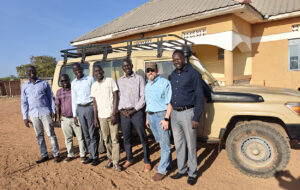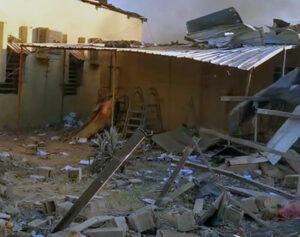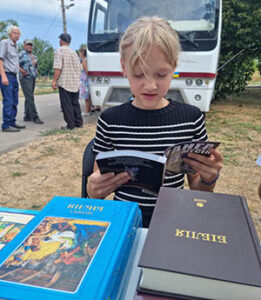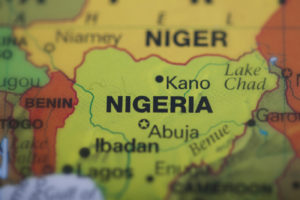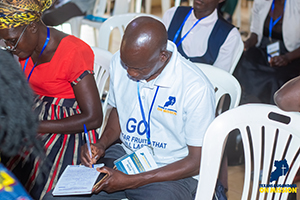Kevin Abbott was pastor of First Baptist Church of Red Oak in 2014 when God placed a burden on his heart to partner with local indigenous pastors in South Asia, and he began praying for a partnership.
“We were supporting somebody in China. We were supporting somebody in Honduras,” said Abbott, now an area representative for Texas Baptists and director of Pastoral Health Networks.
“But I felt like God wanted us to have a personal relationship and partnership with somebody on the ground in South Asia, where some of the highest levels of persecution were starting to happen.”
Two years later, Joe Moody—Abbott’s former pastor and founder of Light the Window Ministries—invited him to have coffee. Moody told Abbott he needed to meet a church planter in South Asia whom he called “the Billy Graham of Nepal.”
“He’s the guy that’s well-respected and moving and shaking when it comes to evangelism and church planting and lots of very cutting edge, at least for Indian people in that area, cutting-edge church-planting movement and gospel-movement-type stuff,” Abbott explained.
When the South Asian church planter visited the United States, Abbott met with him. After the meeting, Abbott set up a trip with his church’s leadership team to “see the work on the ground [in South Asia] and go to villages and meet pastors.”
“We came back, and we were all convinced that God wanted us to partner with South Asia and [the church planter] … and the rest is history,” Abbott said.
Aside from a two-year gap during the COVID-19 pandemic, Abbott has traveled to South Asia every year since then—“always trying to pour into their leaders and connect resources to them and their needs,” he said.
Focus on developing pastors as leaders
Before joining the Texas Baptists staff, Abbott developed the Resilient Pastors cohorts at Union Baptist Association. The six-month learning cohort focused on the five habits of leaders who finish well.
Every time the South Asian church planter visited Houston, he participated in a Resilient Pastors cohort and “really loved what we were doing.”
“He said, ‘Man, I would love to bring this to South Asia,’” Abbott recalled. “I said: ‘Well, that’s great. Let’s talk about it,’ [and] that turned into a two-year conversation.”
When he moved to the state convention staff, Texas Baptists had launched its own similar program—Pastor Strong.
That’s when Abbott developed the idea for Pastor Strong South Asia—bringing together elements of what he had learned in Houston with what Texas Baptists developed.
On Jan. 20-25, 11 pastors across South Asia met in Nepal for a week-long training on leadership development, focusing on material from J. Robert Clinton’s The Making of a Leader. The pastors learned “how God develops a leader over a lifetime and how we can use that as a model of developing our leaders.”
Most of the pastors also serve regionally, mentoring between 5 and 15 pastors each. So, they also went through coaching skills training to get “some tools in their bag” for shepherding, Abbott said.
High level of commitment
He was encouraged by the level of commitment from the pastors to learn and be in community together.
“[I] told them up front that this is an alongside formation environment, that we are in a cohort together and really hammered home pretty strong the value of learning and community—that it wouldn’t be me lecturing, but we’re learning together, and they really took off on that,” Abbott said.
“It’s kind of a foreign concept to them, and so for them to really engage in that was pretty powerful to watch.”
Each day centered on a different theme. The first day evaluated how to finish well. Drawing from The Making of a Leader, the pastors considered the six barriers to ministry and the five habits of finishing.
The second day was a session called “Focused Living,” which helps pastors gain clarity about their “unique kingdom calling.” During the session, participants create a sticky-note timeline of their life to “gain sovereign perspective of how God has shaped them” for their purpose.
Spontaneous time of worship and praise
Abbott said at the end of the day, the pastors reflected on their timelines and were encouraged to “mine out of each chapter a couple of blessings from God or lessons.” After concluding the time with prayer, an older pastor among the group “stood up with his hands in the air and just started singing a worship song.”
“He was singing this worship song from his heart language of Nepali,” Abbott said.
His friend the South Asian church planter leaned over and told Abbott: “This is what he’s singing: I will sing your praise with thanksgiving, oh Jesus, my Lord. Your goodness to me is numerous, millions of thanks. You have given me more than my merit with your compassion.
“I have received more than I have asked for. I’m grateful to you, oh Lord. You are the true and living God. I have my trust in you, Lord; give me the gifts so I may serve you in such a way that I may get rewards from you.’”
He said every other pastor soon joined the spontaneous worship session.
“I didn’t know what to think. I was like, ‘Oh, this is powerful,’” Abbott said. “So, those are some of the beautiful things—spontaneous things—that [came] out of this with these leaders.”
Abbott said Texas Baptists pastors could learn a lot about the power of prayer and passion for the gospel from their South Asian counterparts.
“As Americans, we tend to get self-dependent… and it’s so refreshing to go into an environment like India or Nepal or countries like that… [because] these pastors, they don’t do it for the money, they do it for the love of God and the kingdom call of ministry,” Abbott said.
“Their hearts bleed the gospel and the need for people. Their passion about the gospel is real.”
He said the group closed every evening on their hotel’s rooftop patio in a glassed-in room, which they called the “Upper Room” in reference to Acts 1:12-14, sharing what they learned from the day and praying over each other.
Taking the model home
At the end of the week, the pastors were commissioned to “take this model to your leaders in your regions” to train them to utilize the same skills they learned during Pastor Strong.
Abbott said he wants the Pastor Strong South Asia cohort to be an encouragement to Texas Baptists pastors that the work being done in Jesus’ name around the world “[is] not dead.”
“I would encourage our pastors to really lean in and partner with local pastors and … church planter leaders in some of these countries, especially the 10/40 window where the most unreached people groups are, which happens to be mostly Muslim countries and Asian countries,” Abbott said.
Looking to the future of Pastor Strong Cohorts, Abbott said he desires for Pastor Strong Texas cohorts to have a “true partnership” with Pastor Strong South Asia cohorts to connect and provide tools and resources for them.
He said he would eventually like to set up a sponsorship program where Texas pastors can directly adopt a church and pastor financially.
The main priority at this time, he said, is for Texas pastors to “gain awareness of what God is doing [in South Asia].”
“I think it is a great marriage to partner what we’re doing here with pastors in Texas and what we’re doing at the same time with pastors in South Asia now,” Abbott said. “[I] really wanted there to be this type of partnership and support amongst our local pastors with what God’s doing internationally.”
Abbott said this trip “reconfirmed the power of the process” and the design of the cohorts.
“[I learned] that this type of training… works in any culture, in any language, and that leaders struggle with the same things everywhere; it just is flavored a little bit different,” Abbott said.
“I was reaffirmed in Nepal in this training, once again, the power and the need for what we’re trying to do as Pastor Strong Cohorts in Texas: that we want a different type of environment. We want an environment where you come alongside each other, and you learn together… [It was] a confirmation that what we’ve been doing is valuable.”
